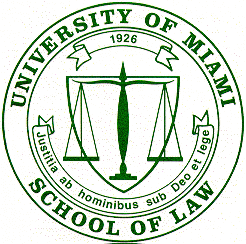 Law
and the Internet 1998
Law
and the Internet 1998 
 Law
and the Internet 1998 Law
and the Internet 1998  |

Monday Room 110A, 4:30-6:20The book store should have the book for the course: WEB Publishing for Dummies (1997). You should feel free to substitute any comparable introductory guide to writing an HTML document (also known as a World Wide Web page), including those found on the Internet.
All other course materials will either be in the Distribution Center, directly from the World Wide Web, or the result of your own researches.
You should get a message back confirming your subscription. Once you are subscribed, to send e-mail to the list, address the e-mail to: intlaw98@law.miami.edu
Anything you send to the list will be distributed to the entire class.
Attendance. I will take not take formal attendance in this class, but I can't help but notice who is missing sometimes. Since we only meet once a week, you ought to be able to make it. Any student who skips often enough for it to become noticeable will suffer some deduction from class participation credit.
Taping. No classes may be taped without my specific permission, which will not be given for reasons other than verified medical emergencies, or to students with particular disabilities.
No Exam. Grades will be based predominantly on your production of a World Wide Web (WWW) page or pages that discuss an Internet-related legal subject. I am more interested in the content of your legal analysis and the depth of your research than I am in your snazzy graphics or cute Netscape tricks...although those are nice too. Your grade will also include a substantial class participation component. I expect everyone to do the reading and to be prepared for class. Class participation includes taking part in assignments to do something and report to the class mailing list in a timely way.
The writing project should be the intellectual equivalent of a 30+ page paper, but must be in a format that can be read on the World Wide Web by a standard browser. You are not required to jazz up the paper with fancy WWW tricks, but you may if you want. Content and and quality of legal analysis will be the critical factors affecting your grade, although I will give some credit for projects that use WWW technology in an appropriate and useful manner. (Please don't overdo it!) The paper must in HTML or in another format that is readable with free tools available on the Internet: no proprietary formats are allowed. This means, for example, that written work submitted on "dead trees" (paper) or in WordPerfect, or Microsoft Word, is not acceptable.
Writing project. You may select any topic related to the subject of the seminar. I will be happy to help you pick a topic if you have a general area of interest, although experience has shown that the best writing tends to result from topics that students choose themselves. Please turn in a two page -memo (on paper) on your proposed paper topic, listing the issues you intend to address and (perhaps) your first guess as to what you will say about them no later than our third class; based on this memo I will either approve the topic or propose modifications. We will discuss the due date for the rough draft in our first class of the year. I will return the rough draft with comments as soon as I can, on a first-come, first-served basis. These rough drafts (together with any editing you may have done after turning it in) will be the basis for an in-class discussion of your projects. You will not be graded on your rough draft -- the comments are entirely for your benefit with no strings attached. The final draft is due April 28, 1998 at 4:00 p.m. In addition to posting the final draft on your web site and sending me an email containing information on how to access it, please turn in a floppy disk containing the full project to my secretary, Rosalia Lliraldi, outside room 382 in the library.
Class participation. Your participation in the seminar will help make it fun and interesting for everyone and can enhance (or, in very rare cases, depress) your grade. I will be asking a few people to lead discussions each week -- watch this page for details. I will not take formal attendance, but in a group this small it's impossible for me to fail to notice when you are missing. You are expected to do the required reading before class; it would be nice if you could at least skim some of the optional materials.
Online fora. We will be experimenting with various means of online communication. The primary tool will be a class mailing list. You are expected to read all email from seminar participants. You are invited to participate in the on-line discussions; a few of the class assignments will require you to send messages to class. We will also have at least one "virtual class" in which we will dispense with the physical seminar. Participation in these fora is like class participation.
You can call me at 284-4285. Most days, I am in and out of the office. If you get my voice mail, leave a number and state when is the best time to call back.
You can come by my office, Rm. 382, any time, but since I'm in and out erratically, I advise you to call ahead and make an appointment. I'll have regular office hours.
Probably the easiest way to contact me is to send me e-mail at froomkin@law.miami.edu. Include a telephone number if you prefer a more human response.
Version 1.2 Last modified: May 12, 1998.